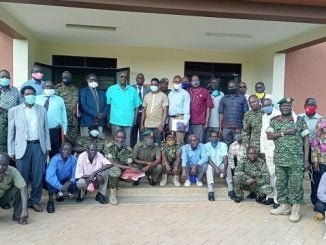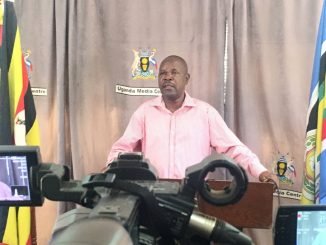
Kampala, Uganda | By Michael Wandati | In an exclusive interview with the NTV Uganda television channel, Mr. Henry Oryem Okello, the State Minister for Foreign Affairs, expressed his perspective on the issue of hunger, calling those Ugandans who have died of hunger are “idiots.”
The minister stated that individuals in Uganda facing starvation are not utilizing the favorable climate for farming. Mr Oryem emphasized the country’s agricultural potential, encouraging citizens to cultivate their land and sow sufficient seeds to address food shortages.
“Those are idiots… real idiots that can die of hunger in Uganda. Those are idiots because there is enough food in Uganda. If you work hard, there is land in Uganda, the climate is right inspite climate change, if you make double efforts to make sure that you go out in the morning, till your land you plant the seeds, you maintain your plantation, surely, how do you fail to get food?,” Minister Oryem said in the interview.
This comes days after President Museveni addressed the Non-Aligned Movement (NAM) delegates, where he asserted that disturbing images depicting Ugandans nearing death from starvation, particularly in the restive Karamoja sub-region in the country’s northeastern area, do not accurately portray the overall situation across the African continent.
“When you are out there, you may get stereotypes that we have no food, but we are dying from food here. Those images you see are not representative of all of Africa. I’m very glad to have this presence of many people so we can interact with you,” Mr Museveni said in his opening remarks after assuming the chairmanship of the 19th NAM summit on January 19, 2024 in Kampala.
Both Mr. Oryem and Mr. Museveni, who has held power since 1986 after ascending through guerrilla warfare, made these statements just months after the Uganda Human Rights Commission (UHRC) released a report in May 2023. According to the report, the mineral-rich Karamoja sub-region witnessed at least 2,000 deaths attributed to hunger within a year.
Among the districts, Kotido recorded the highest number of starvation and hunger-related deaths at 1676, followed by Kaabong with 225 deaths, Moroto with 166 deaths, and Napak with 135 deaths in 2022. Karenga district documented only eight deaths in relation to hunger.
The UHRC’s report highlighted that the pervasive hunger in the region stemmed from prolonged dry spells, resulting in acute famine and claiming the lives of at least 2,207 individuals.
“According to the Integrated Food Security Phase Classification (IPC) and Acute Food Insecurity (AFI), 41 per cent of the population in Karamoja were facing high levels of food insecurity between March and July 2022,” the report reads in part.
“The long dry spell in the region was partly due to state failure to anticipate, reduce and rapidly respond to disaster risks. Climate change is a grave threat to people worldwide if the government fails to take reasonable and rational measures to safeguard against it,” the report further stated.
The commission identified various factors contributing to famine in the region, including insecurity and intensified livestock raids, low crop yields, crop destruction by wild animals, poverty, and alcoholism. The resulting acute famine not only claimed lives but also left hundreds of children malnourished, with over 300 cases reported in Kotido District.
While government, local, and international NGOs provided substantial aid last year, the UHRC emphasized the necessity for long-term solutions instead of temporary donations that leave the region vulnerable to future famines.
The UHRC recommended that the government prioritize early warning signs of drought to mitigate disaster effects. Additionally, they called on Parliament to pass the National Food and Nutrition Bill, aiming to uphold the right to food and address malnutrition concerns.
Meanwhile, Minister Oryem calling those who have died of hunger in Uganda as “idiots,” his comments have sparked outrage.
Also Read: Ugandan minister wants lazy-poor Ugandans beaten to become rich
Moses Aleper, a legislator representing Chekwii county in the impacted Karamoja region, expressed disagreement with Mr. Oryem’s perspective, deeming it “not right” and describing it as “unfortunate” particularly given the minister’s familiarity with the country’s circumstances.
“I’m from one of the most productive parts of Karamoja where there is adequate rain and we produce food. But in situations where weather fails us, the weather vagaries set in, we definitely fail to get food. And normally people definitely get famine and eventually hunger strikes,” he said.
According to Mr. Aleper, famine in the region is frequently influenced by factors “beyond even human control,” including the changing climate.
Charles Onyango-Obbo, a prominent Ugandan author and journalist, criticized Mr. Oryem, asserting that the minister overlooked the fact “that hunger in a country like Uganda is a distribution/market problem.”
While official data on the current food situation in Karamoja is not available, the region often faces hunger during dry seasons due to its semi-arid climatic conditions.



